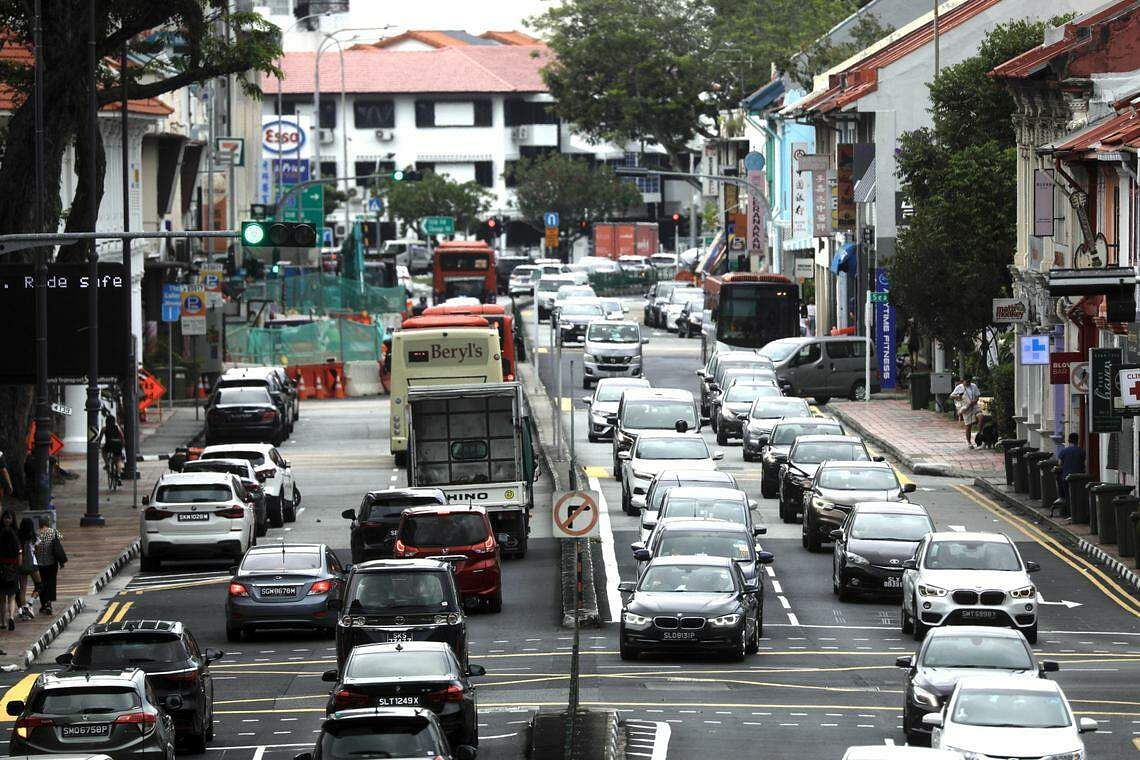SINGAPORE - The Israel-Hamas conflict dominated the House on the first day of Parliament’s November sitting. MPs and ministers condemned violence against civilians, and urged cohesion and harmony.
Other matters discussed included the increase in the supply of certificates of entitlement (COEs) for cars and the millions of incomplete transactions as a result of the Oct 14 banking disruption.
The key takeaways:
1. MPs condemn Israel-Hamas war
MPs from the People’s Action Party (PAP), Workers’ Party (WP) and Progress Singapore Party (PSP), including Deputy Prime Minister Lawrence Wong and Foreign Minister Vivian Balakrishnan, condemned the violence against innocent civilians in the Israel-Hamas conflict.
They stressed that the conflict should not divide Singapore, and urged the safeguarding of multiracial and multi-religious peace and harmony.
Monday’s motion was raised by three PAP MPs: Mr Vikram Nair, Mr Alex Yam and Mr Zhulkarnain Abdul Rahim. It had six action points including advocating for the urgent delivery and unhindered access of humanitarian aid to civilians in Gaza.
Why it matters
DPM Wong said Singapore is not immune to divisive forces and that the country cannot afford to be complacent. He said: “We know from our own painful history how disastrous ethnic and religious strife can be. And that’s why we have worked so hard over the years to foster social harmony across our different communities.”
Meanwhile, WP chief Pritam Singh emphasised the need to consider the recent hostilities in their wider context, while PSP’s Mr Leong Mun Wai called on the Government to enhance education on Israeli-Palestinian history to reduce the risk of biased, inaccurate or one-sided emotional discourse influencing Singaporeans.
2. Police reports made over offensive remarks, actions against Jews or Muslims
Eight police reports on offensive remarks or actions targeted at the Jewish and Muslim communities were lodged here in October – about the same number of reports received between January and September, said DPM Wong.
He also said that since the conflict started, regional Internet traffic on extremist sites has gone up threefold. The Government has also seen more anti-Singapore rhetoric, including violent threats against the Republic by regional extremist elements online.
Why it matters
Minister of State for Home Affairs Muhammad Faishal Ibrahim, who spoke later in the session, said Singapore’s security agencies are on heightened alert.
He noted that those who engage in offensive conduct are a minority in Singapore, and that most Singaporeans have been measured and mature in their response, even where views on the conflict have differed.
3. More COEs from future peak years to be brought forward to tackle supply trough

The Government will ensure that the supply of COEs for cars will continue to increase in 2024 until the peak supply years in 2026 and 2027, by bringing forward more quota from COEs guaranteed to expire in future.
The hope is that this will tamp down COE premiums, which are at an all-time high, while maintaining Singapore’s zero-vehicle growth policy, said Acting Transport Minister Chee Hong Tat.
Why it matters
COE prices have been rising over the past two years and show no signs of coming down, with the premium for larger cars and the Open category breaching the $150,000 mark in October.
Mr Chee was circumspect about the impact that the “cut and fill” approach to boosting supply will have on premiums, saying that the authorities have no control over market demand.
He also said car-leasing companies were unlikely to be the main factor for the increase in car COE prices, as premiums have risen despite demand from these companies falling.
If you have a few more minutes:
Next-gen ERP on-board units more reliable than using smartphones
The on-board units (OBUs) that will be installed in vehicles for a satellite-based Electronic Road Pricing (ERP) system, or ERP 2.0, can better ensure reliability and performance, and reduce operational challenges, said Senior Minister of State for Transport Amy Khor.
This is because the three-part OBU, which has been criticised for its bulkiness, is a “common and trusted standard-issue device”, she added, when asked if the ERP 2.0 system could be replaced by smartphones instead.
Dr Khor said location data accuracy can vary across phones, increasing the risk of motorists being charged incorrectly.
Allowing smartphones to process ERP transactions also adds inconvenience, as some may inadvertently forget to start the relevant mobile app.
Signs will be put up to demarcate an ERP-charging location. There are no immediate plans for distance-based charging.
Digital banking service disruption in Oct caused millions of incomplete transactions
About 2.5 million payment and ATM transactions could not be completed during a major service disruption on DBS Bank’s and Citibank’s digital banking platforms on Oct 14.
As many as 810,000 attempts to access the banks’ digital banking platforms also failed during the disruption, which lasted for more than 12 hours, said Minister of State for Trade and Industry Alvin Tan.
He explained that the incident was caused by a malfunction of the cooling system in the data centre hosting both banks’ IT systems.
When asked if the Monetary Authority of Singapore’s (MAS) regulatory approach was enough to get banks to improve their digital resilience, Mr Tan, who is an MAS board member, said the banks and financial institutions involved are being held accountable and further measures would be taken if needed.
He said MAS will work with the financial industry to incorporate key learnings from this incident into all banks’ risks management controls.
Eating out contributes to Singaporeans’ excessive sodium intake
Consuming added salt, sauces and seasoning while dining out is the main reason for Singaporeans’ high sodium intake, rather than processed foods purchased in stores, said Senior Parliamentary Secretary for Health Rahayu Mahzam.
Hence, the Government will focus on collaborating with salt and sauce manufacturers, and is planning to engage food operators, industry associations and professional groups to reduce salt intake.
While Singapore has studied how other countries have tackled high sodium consumption through warning labels or taxes on food items that have unhealthy levels of salt and sugar, Ms Rahayu said the country would take a tailored approach to addressing the matter based on consumption habits.
This comes after Health Minister Ong Ye Kung said in September that the authorities are studying possible regulatory measures to curb sodium intake.
As part of a multi-pronged approach, the Government will also engage food operators to promote the adoption of lower-sodium ingredients, and step up public education efforts to promote the use of lower-sodium ingredients.


